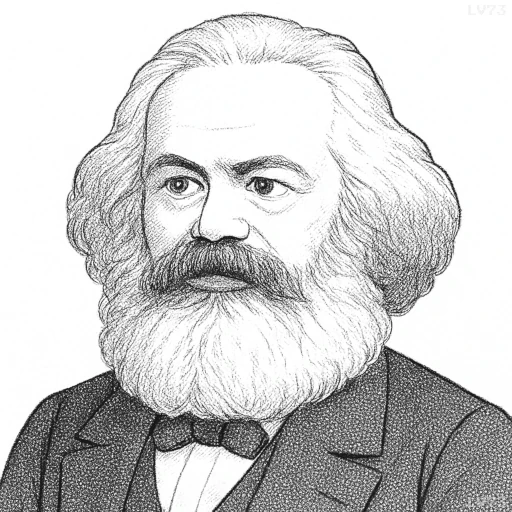“In a higher phase of communist society… only then can the narrow horizon of bourgeois right be fully left behind and society inscribe on its banners: from each according to his ability, to each according to his needs.”

- May 5, 1818 – March 14, 1883
- Born in the Kingdom of Prussia (Germany)
- Philosopher, economist, political thinker
table of contents
Quote
“In a higher phase of communist society… only then can the narrow horizon of bourgeois right be fully left behind and society inscribe on its banners: from each according to his ability, to each according to his needs.”
Explanation
In this quote, Marx is envisioning a future phase of communist society where the principles of bourgeois right, which are rooted in capitalist notions of private property and individual rights, are completely overcome. The phrase “from each according to his ability, to each according to his needs” expresses the ideal Marx had for a fully developed socialist or communist society, where resources are distributed not based on one’s contribution or labor value, but according to individual needs. This principle is meant to eliminate the inequalities that exist in capitalist systems, where people’s access to goods and services is largely determined by their wealth, class, or labor power, rather than what they actually need.
Historically, Marx argued that under capitalism, society is organized in a way that prioritizes the accumulation of profit over human welfare. In this context, bourgeois right refers to the legal and economic systems that support private property, wage labor, and inequality. The “higher phase” of communism Marx refers to is a stage where class distinctions no longer exist, and with it, the systems of exploitation and oppression are abolished. The full realization of communal ownership and the dissolution of the state as an instrument of class rule would pave the way for such a society, where people contribute based on their abilities and receive according to their needs, ensuring fairness and equality.
In modern terms, this ideal is still discussed in debates about social justice, wealth redistribution, and universal basic income. Marx’s vision challenges current capitalist structures, where economic inequality is often exacerbated by profit motives, and where the poor and marginalized face barriers to accessing basic resources. While many see this principle as utopian or unrealistic, it remains influential in discussions about how a more just and equitable society could function, particularly in the context of technological advancements that could allow for the equitable distribution of goods and services, as well as redefined measures of value in a post-capitalist world.
Would you like to share your impressions or related stories about this quote in the comments section?

